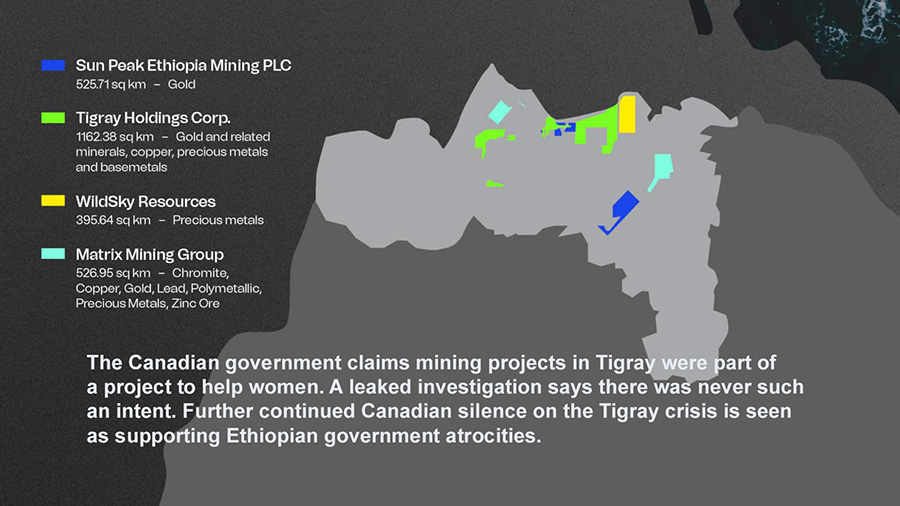
The Canadian government claimed mining projects planned in Tigray were a part of a foreign policy to help women. A leaked investigation reveals there was never such an intent. Further Canadian silence on the humanitarian crisis is seen is facilitating continued Ethiopian atrocity. In the midst of controversy, academics at Canadian universities with close ties to the Canadian Mining Association, have also sought to prop up the Ethiopian government and shed light away from Canada.
To hide growing complaints of exploitation of indigenous peoples by their mining activities in foreign countries the Canadian government created a false cover of mining being a foreign policy to help women in Tigray. Many have speculated that the ongoing war between Tigray and the Ethiopian government which saw thousands of women suffer violence has been encouraged by the silence of the government of Canada on the humanitarian situation in Tigray.
The Canadian government in cooperation with the powerful lobby of the Canadian Mining Association started a program in 2016 of six smaller mines in Ethiopia mostly in Tigray. The initial $15 million dollar project by the Canada’s Global Affairs department. The success of Canadian mining in Eritrea offered hope that similar returns could be seen in Ethiopia as it was reported that $1 billion a year was being added to the Eritrean budget. Under Abiy Ahmed the government had wanted to increase mining to be 10% of the Ethiopian gross domestic product.
Wide spread criticism of Canadian exploitation in foreign mining by MiningWatch Canada and other advocates began to develop in the last two decades. MiningWatch Canada is a watchdog organization that has been reporting on abuses of the Canadian mining industry in underdeveloped countries where they see a pattern of exploitation of indigenous peoples by one of Canada’s largest industries. Law suits were filed against Canadian mining interests in Canada against their Nevsun mine in Bisha, Eritrea. The plaintiffs claimed slavery and torture occurred at the site. Ultimately a large settlement was paid and that 90% of the ownership of the facility was sold to Chinese interests to avoid further litigation.
Subsequently to present mining as a positive foreign policy in 2018 Canadian support to Ethiopia’s mining sector has been guided by Canada’s Feminist International Assistance Policy (FIAP), developed in 2018 by the Liberal government to integrate gender equity and empowerment of women and girls into its foreign aid.
A leaked government review of the mining plans and procedures by the Canadian Executive Service as reported by the Canadian website ,The Breach, noted that although the mining project could bring $4 billion in revenue the activity was not benefiting any goals of protecting women. In fact it was alleged that the Canadian government was protecting its own financial interests rather showing concern for the humanitarian situation developing in Tigray.
Sidney Coles, the administrator of the review, reviewed the sites, government officials, and humanitarian groups. She came to the following conclusions
“This is not only not happening, it felt to me like a bold-faced lie that cost $12 million,”
“Aiding the Ethiopian government in this way has directly benefited Canadian mining interests across the country, but most alarmingly in the Tigray region where the governments of Ethiopia and Eritrea have been accused of engaging in genocidal activity,”

